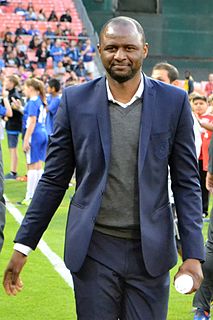Top 53 Quotes & Sayings by Patrick Vieira
Explore popular quotes and sayings by a French coach Patrick Vieira.
Last updated on April 14, 2025.
In my time at Arsenal, we had a really good balance. We had players who were fast, players who were really strong physically, and players who were really creative. When you look at the generation of Arsenal at the moment, they may be playing better football than we used to, but they win less than we used to - so, where's the balance?
I love London. I feel at ease there; I can push my trolley in the supermarket without being bothered. If I want to go to a club, a cinema, or have a walk, I am free - free to live my life as I wish. I have talked about it with some players, and I am convinced that we are in one of the best countries.
I sincerely think that firing Roger Lemerre was the easiest solution. There had to be a guilty party, and it was him. He was the ideal prey. He had his share of responsibility like everybody else, like the French FA who organised friendly matches at the other end of the world, but the actors - the players - have the greatest share of it.






















